- Category
- Life in Ukraine
As the War Nears Its Third Year, Here’s What Peace Means For Ukrainians
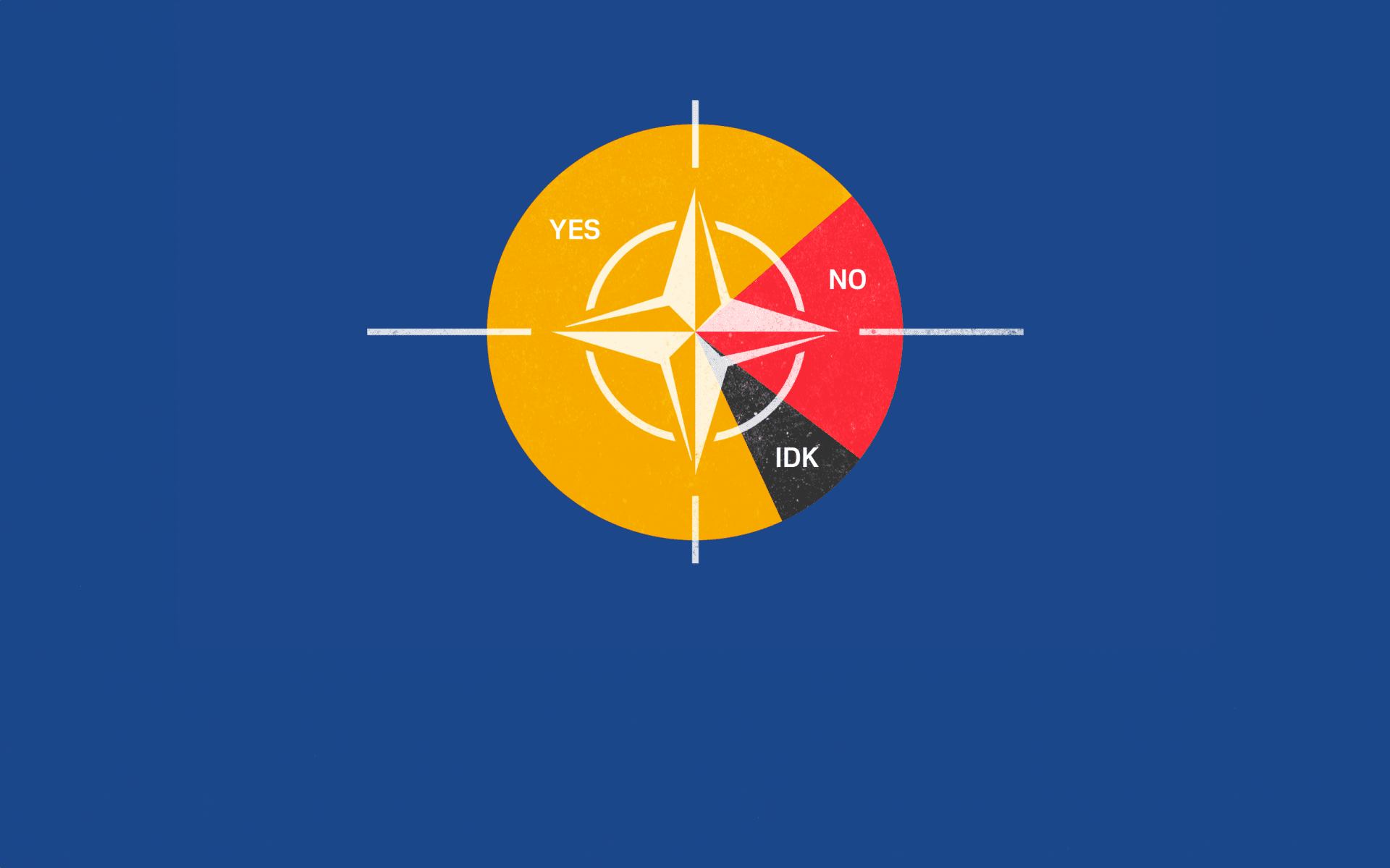
In a recent national poll, Ukrainians shared their thoughts on negotiating with Russia, the EU, and NATO, as well as which foreign figures they trust the most.
As conversations increasingly focus on Ukraine’s willingness to negotiate, a recent nationwide survey commissioned by the New Europe Center offers insight into public opinion. In November 2024, Ukrainians from around the country were asked under which circumstances they would consider negotiating with Russia, as well as security guarantees, European Union Integration and NATO membership. The poll offers an insightful look into the opinions of everyday Ukrainians as they enter the third year of war since Russia’s full-scale invasion.
Security guarantees
Compared to 2023, Ukrainians have softened their willingness to consider compromises but remain firm on key issues. 64% of Ukrainians polled believe that Ukraine should not negotiate with Russia unless they receive security guarantees from the West because Russia would restart war again. Most said they would consider negotiations if Russia withdrew all troops and reverted to pre-February 2022 borders, excluding areas like the Donbas and Crimea, which were illegally annexed by Russia in 2014. While over one-quarter said they would consider negotiations in the event of security guarantees from the West.
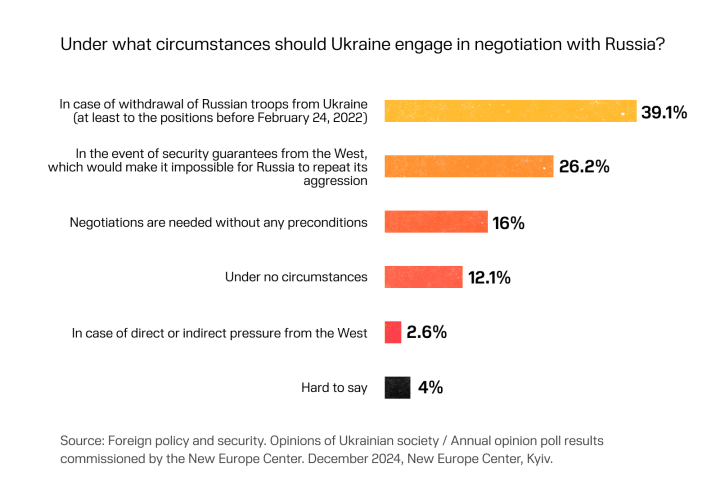
The slight shifts in opinion on other hypothetical compromises, such as delaying NATO or EU membership, likely stem from war fatigue rather than any genuine desire to concede to Russian aggression. Ukrainians ages 30-39 were the biggest supporters of negotiations, likely given that they have seen the most civil unrest; they were born at the fall of the Soviet Union, came to adulthood during the Maidan Revolution, lived through Covid-19, and lived through two Russian incursions into their country. Ukrainians have learned from history that any deal with Russia without ironclad guarantees of security would only delay further conflict.
NATO membership
For Ukrainians, security remains the ultimate priority with over 64% of respondents beliveing the country should not negotiate with Russia unless they receive security guarantees from the West. At the moment the most popular guarantee is NATO membership. While in the past, the population was divided on joining the alliance, over the course of the full-scale invasion, attitudes have shifted, with most believing that there is no alternative but to join.
The path to membership proposed in the survey would be modeled after West Germany’s accession to NATO in 1955. It would involve Ukraine receiving an invitation to the Alliance within its internationally recognized borders with the exception of its occupied regions. Article 5 protections would initially cover only unoccupied territories but would extend to the entire country once all regions are liberated. For many Ukrainians, this option represents a realistic pathway to long-term security.
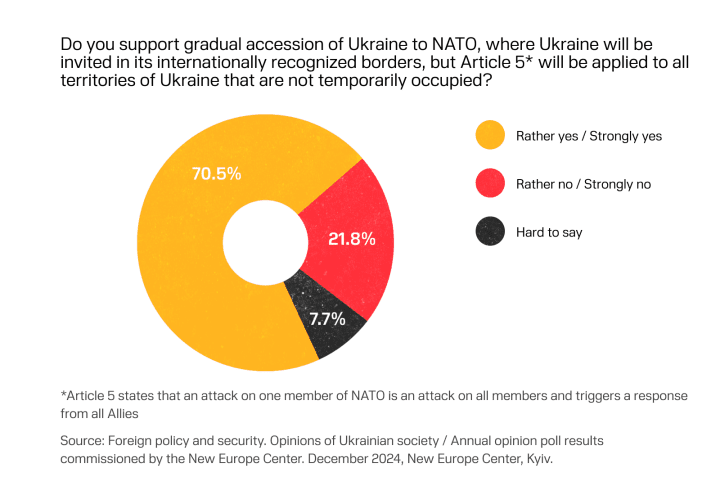
Leading up to the full-scale invasion in 2022, support for NATO membership among Ukrainians steadily increased, reflecting a growing desire for security guarantees in response to Russia’s illegal occupation of Crimea and parts of the Donbas region. Between the early 2000s and 2014, support for NATO rose from 13-15% to over 45% by mid-2014, coinciding with Russia’s aggression. By 2017, this figure reached record highs, demonstrating that Russia’s illegal invasions of Ukraine have only driven the country closer to NATO, contrary to Vladimir Putin’s claims that NATO expansion prompted his actions.
Trust and frustration
Ukrainians remain deeply committed to partnerships with Western democracies and institutions such as the European Union, NATO, and the G7. The EU leads with a 69.2% approval rating, followed by NATO at 64.4% and the G7 at 62.4%. These alliances are viewed not only as symbols of security but also as gateways to Ukraine’s future prosperity.
However, trust in individual Western leaders tells a slightly different story. Ursula von der Leyen, President of the European Commission, and Polish President Andrzej Duda top the list of trusted foreign leaders, with trust levels of 65% and 64.6%, respectively.
Yet trust in US President Joe Biden and German Chancellor Olaf Scholz has dropped significantly. Biden’s trust rating fell from 82% last year to 55.2% this year, while Scholz experienced a decline of 24.5 percentage points. Many critics have accused the German leader of adopting an overly cautious approach. Even his political opponents within the German government are campaigning on platforms that advocate for a stronger stance on Ukraine, including the provision of long-range missiles—steps that many Western countries have already taken.
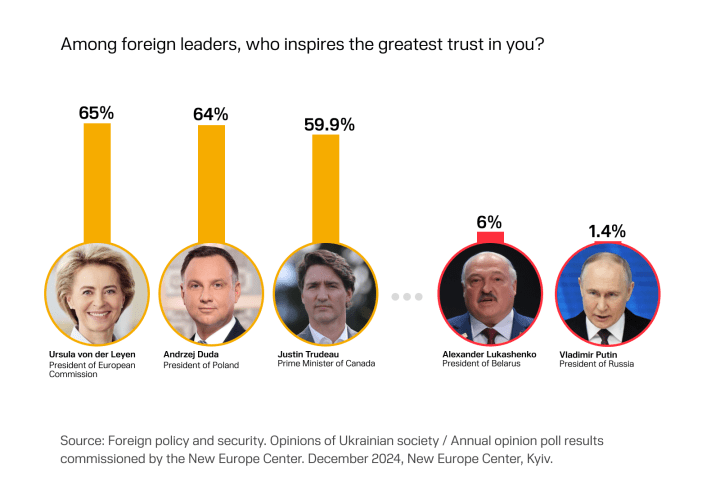
The one exception to this trend is French President Emmanuel Macron, whose trust level grew from 54.5% to 58.4%. Macron’s vocal advocacy for Ukraine’s NATO invitation and his efforts to push Europe towards a larger role in the war resonated with Ukrainians who felt he was taking a more active stance compared to his European counterparts.
The EU and continued Western support
One of the survey’s more optimistic findings is Ukrainians’ strong belief in their country’s path toward EU membership. Ukraine has been striving for this goal since the early 2000s. In 2014, mass protests erupted after President Viktor Yanukovych rejected a path to EU integration in favor of closer ties with Russia. Since then, joining the EU has remained a steadfast aspiration for Ukraine, symbolizing the nation’s desire for self-determination and progress.
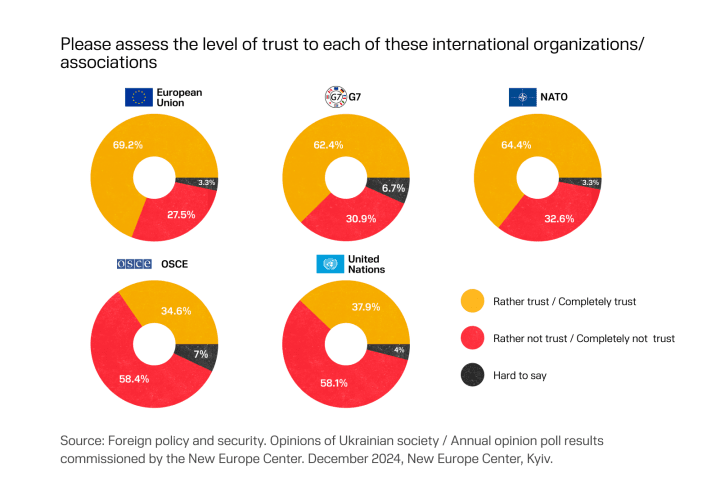
A strong 34% believe Ukraine will join the European Union within five years, aligning with statements from Ukrainian officials who see integration as a realistic and necessary goal. While Ukrainians understand the challenges ahead, including the need for extensive reforms, they also emphasize the importance of continued Western pressure to combat corruption. Sixty-three percent believe external pressure is essential to implement this change, showing that Ukrainians view the EU and US as partners in reform rather than nation-builders.
At the same time, there is a growing concern that corruption is sometimes used as a pretext by the West for limiting aid. The perception that Western partners are withholding greater support undercuts, in some cases, undermined this confidence.
A call to action for Western partners
Ultimately, Ukrainians want to see world leaders take a more decisive stance in holding Russia accountable for its illegal invasion. For over a decade, Ukraine has resisted aggression, often while much of the West stood by. Although trust in Western institutions and leaders remains strong, it is beginning to waver under the weight of frustration and urgency as the full-scale invasion enters its third year. Now is the time for Ukraine’s allies—particularly the United States, the UK, and the European Union—to reaffirm their commitment to Ukraine’s future. Providing timely and increased military aid, outlining a clear roadmap for NATO membership, and supporting Ukraine’s EU accession are essential priorities for the year ahead.
-fca37bf6b0e73483220d55f0816978cf.jpeg)
-9a7d8b44d7609033dbc5a7a75b1a734e.jpeg)

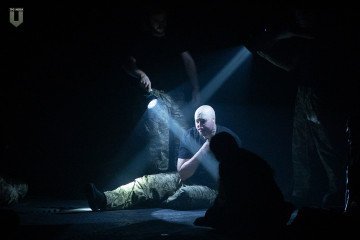
-554f0711f15a880af68b2550a739eee4.jpg)


-6ead6a9dd508115a5d69759e48e3cad1.jpg)
-29a1a43aba23f9bb779a1ac8b98d2121.jpeg)